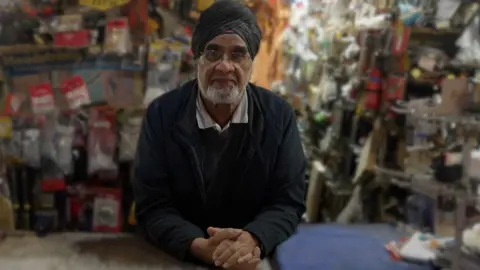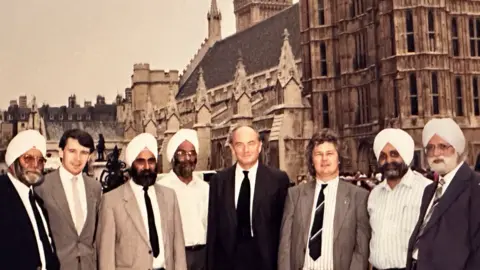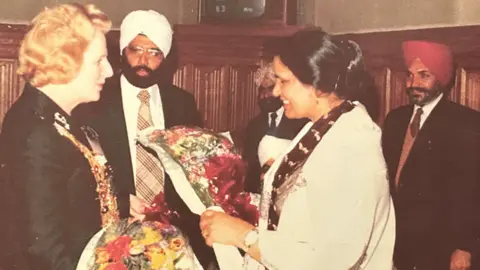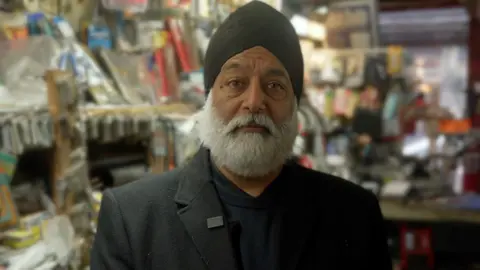'A turban wasn't allowed on building sites'
 BBC
BBC"It was difficult to get a building site job wearing a turban, which wasn't allowed," recalls hardware business owner Jagjit Singh Rayat.
Ahead of his retirement, Mr Rayat has been reflecting on how he helped shape a moment in modern British history by advocating for religious freedom in the workplace.
He was part of a successful campaign in 1988 that helped to change the law, to allow Sikhs to wear turbans instead of safety helmets on building sites.
His family business M S Rayat & Sons closed on 23 November, after 50 years of trading in Hanwell, west London.
'Sikh identity'
"My father, who started this business, came [to the UK] in 1956 from Africa," Mr Rayat said.
"We joined him later in 1960 and then we worked together. We started a construction company.
"It was difficult to get a building site job wearing a turban, which wasn't allowed. You had to wear a hard hat.
"To get that law changed, my father, with the Conservative Club from Ealing, went to the Houses of Parliament to meet Mrs Thatcher and William Whitelaw to tell them that this is necessary - that they have to wear the turban as a part of the religion.
"It's the Sikh identity."
 Handout
HandoutMr Rayat explained that he supported his father Mohinder Singh Rayat in the campaign.
"I'm very proud and it was a good achievement to get the law changed, and the freedom for the Sikhs to wear a turban on a building site," he said.
"I feel proud that my family were part of this campaign that changed the British law."
Since 1989, turban-wearing Sikhs have not had to use head protection on construction sites.
And a clause in the Deregulation Bill 2015 extended the existing exemption in the Employment Act to all workplaces.
It meant employers were legally protected by extending limited liability if an individual suffered injuries due to not wearing head protection.
Sikh motorcycle riders are also exempt from having to wear helmets.

Joga Singh Jutley, a customer at M S Rayat & Sons, said: "We are part of UK society, and UK society has recognised the Sikh faith.
"It means for myself and my children or their children, we can now wear a turban on a building site and don't have to wear a helmet on a bicycle or a motorbike and we thank our forefathers for that."

Mr Rayat said he had decided to sell the family business after 50 years of trading.
Three generations of his family have served the community at the store since the 1970s.
He plans to spend his retirement enjoying time with his family.
"Whenever I've needed something, a set of Allen keys or something like that, Mr Rayat's always had it," said Stephen Brown, customer and local business owner.
"He's always a smiling face. He will be missed in Hanwell."
Listen to the best of BBC Radio London on Sounds and follow BBC London on Facebook, X and Instagram. Send your story ideas to [email protected]
